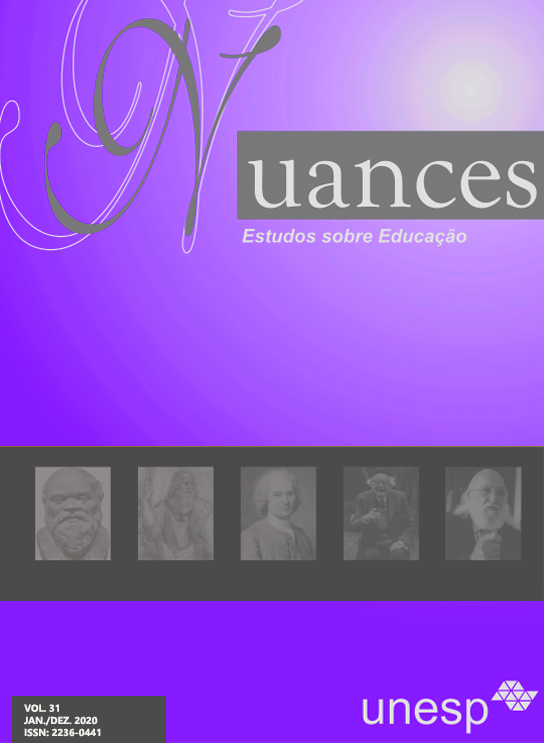Implementação eficiente de programas educacionais na universidade pedagógica
DOI :
https://doi.org/10.32930/nuances.v31i0.8221Mots-clés :
Programa educacional, Resultados de aprendizagem, Competências profissionais e adicionais, Demanda,Résumé
O estudo apresenta novas abordagens para a diversificação dos programas educacionais da universidade pedagógica, cujo objetivo é melhorar a qualidade da formação profissional de professores no contexto de conteúdos educacionais atualizados. Ele também analisa o estado atual da educação no Cazaquistão, descreve as conquistas e os problemas neste campo. O conteúdo dos programas educacionais proporciona uma formação de sucesso e torna os professores modernos competitivos no mercado de trabalho. Leva em consideração o desenvolvimento de competências-chave: comunicação interpessoal, liderança estratégica, prontidão para mudanças, atividades de projeto, colaboração, responsabilidade ética e profissional e gestão eficaz do tempo. As principais prioridades do desenvolvimento de programas educacionais são as seguintes: generalização das atividades acadêmicas e de pesquisa, desenvolvimento e implementação de programas educacionais baseados na orientação prática, interdisciplinaridade, oferta de treinamento em profundidade em línguas e criação de um ambiente educacional único. A estrutura de conteúdo, algoritmo de criação, condições e recursos para a implementação de programas educacionais são descritos. O objetivo deste artigo é definir e resolver o problema do desenvolvimento da educação.
Téléchargements
Références
ATAMEKEN. Professional standard 'Teacher', order of the Chairman of the Board of the National Chamber of Entrepreneurs of the Republic of Kazakhstan 'Atameken'. No. 133, dated June 8, 2017.
BECK S., FREDERIKSEN L. F. Teaching, leadership and school culture from loose to tight coupling. International Journal of Management in Education, vol. 2, n. 1, 2008, pp. 1–13. doi: http://doi.org/10.1504/IJMIE.2008.016227.
BUSH T. Preparing new principals: Professional and organizational Socialization. Educational Management Administration & Leadership, vol. 44, iss. 1, 2016, pp. 3–5. doi: http://doi.org/10.1177/1741143215620317.
BUSH T. School-based research: Extending evidence-informed practice to the institutional level. Educational Management Administration & Leadership, vol. 45, iss. 3, 2017, pp. 379–381. doi: http://dx.doi.org/10.1177/1741143217692733.
CALLAGHER L., HORST M., HUSTED K. Exploring societal responses towards managerial prerogative in entrepreneurial universities. International Journal of Learning and Change, vol. 8, iss. 1, 2015, pp. 64–82. doi: http://dx.doi.org/10.1504/IJLC.2015.069074
CERBIN W., KOPP B. Lesson Study as a Model for Building Pedagogical Knowledge and Improv-ing Teaching. International Journal of Teaching and Learning in Higher Education, vol. 18, n. 3, 2006, pp. 250–257. Access mode: http://www.isetl.org/ijtlhe/pdf/ijtlhe110.pdf.
EGGINTON B. E., BILL E. Introduction of Formal Performance Appraisal of Academic Staff The Management Challenges Associated with Effective Implementation. Educational Management Administration & Leadership, vol. 38, iss. 1, 2010, pp. 119-133. doi: https://doi.org/10.1177/1741143209351660.
FREDERIKSEN L. F., HEMLIN S., HUSTED K. The role of knowledge management in R&D: a survey of Danish R&D leaders' perceptions and beliefs. International Journal of Technology Management, vol. 28, iss. 7-8, 2004, pp. 820–839. doi: http://dx.doi.org/10.1504/IJTM.2004.005785.
HALLINGER P., CHEN Ju. Review of research on educational leadership and management in Asia: A comparative analysis of research topics and methods, 1995–2012. Educational Management Ad-ministration & Leadership, vol. 43, iss. 1, 2015, pp. 5–27. https://doi.org/10.1177/1741143214535744.
ISHANOV P., KHAIROVA G., RUSTEMOVA ZH., ZHUNUSOVA N. Features of Pedagogical Management in the Professional Activity of the Future Teachers. Mediterranean Journal of Social Sciences, vol. 6, n. 4, 2015, pp. 57–61. doi: http://dx.doi.org/10.5901/mjss.2015.v6n4s1p57.
KASYMBEKOV M.B., TEMIRBOLAT B.B., SHAYMERGENOV T.T. Model' Nazarbaeva. Izvestnaya istoriya v novom prochtenii [Nazarbaev's model. A well-known story in a new reading]. Astana: Delovoy Mir Astana Publ. 2016. 164.
KAZIMOVA D. A., SHRAIMANOVA G. S., ABDULMANOVA D. I., ESMAGAMBETOVA D. B. Comprehensive Aspects in Management Competence of Father Pedagogues in Vocational Education System. European Researcher, vol. 78, n. 7–1, 2014, pp. 1278–1285. doi: http://dx.doi.org/10.13187/issn.2219-8229.
LIBBY V. Morris Leadership and the Future of Higher Education. Innovative Higher Education, vol. 35, iss. 1, 2010, pp. 1–2. doi: http://dx.doi.org/10.1007/s10755-009-9129-9.
MIRZA N., MAZHENOVA R., TLEUZHANOVA G., RAMASHOV N., AKBAYEVA G. Implementation of the competence-based approach into the system of training future teachers in higher educational institutions of Kazakhstan. Life Science Journal, vol. 11, n. 9, 2014, pp. 599–605.
PAK Yu. N., IMANOV M. O., PAK D. Yu. Vektory modernizatsii vysshey tekhnicheskoy shkoly Kazakhstana v kontekste Bolonskogo protsessa. [Vectors of modernization of the higher technical school of Kazakhstan in the context of the Bologna process]. Mezhdunarodnyy zhurnal eksperimental'nogo obrazovaniya, vol. 10, 2013, pp. 36–41.
PELEG S. Educational leadership approaches and trends. Education Journal, vol. 1, n. 1, 2012, pp. 9–14. doi: https://doi.org/10.11648/j.edu.20120101.13.
RAHMAN M. M. A., BUTT A. N., CHOI J. N. Rewards and employee creative performance: Mod-erating effects of creative self-efficacy, reward importance, and locus of control. Journal of Organizational Behavior, vol. 36, iss. 1, 2015, pp. 59–74. doi: http://dx.doi.org/10.1002/job.1943.
SARSEKEYEVA Zh. Ye., KARMANOVA J. A., MAZHENOVA R. B., SHARZADIN A. M. Modern Aspects of Teacher Training in Higher Education of the Republic of Kazakhstan. European Researcher. Series A, vol. 52, iss. 6-1, 2013 pp. 1669–1672.
SHKUTINA L. A., SANKHAEVA A. N. Management in education. Modernization and development of training programs in pedagogy and educational management in the countries of Central Asia. Collection of educational-methodical complexes of disciplines and other methodical documents within the framework of TEMPUS EDUCA project. Bishkek, Kyrgyzstan, 2014, pp. 103–193.
TOLOFARI S. New Public Management and Education. Policy Futures in Education, vol. 3, 2005, pp. 75–89. doi: https://doi.org/10.2304/pfie.2005.3.1.11.
TÜRK K. Performance Management of academic staff and its effectiveness to teaching and research – based on the example of Estonian Universities.
TRAMES, vol. 20, n. 1, 2016, 17–36. doi: http://doi.org/10.3176/tr.2016.1.02.
Téléchargements
Publiée
Comment citer
Numéro
Rubrique
Licence
Atribuição-NãoComercial
CC BY-NC
Esta licença permite que outros remixem, adaptem e criem a partir do seu trabalho para fins não comerciais, e embora os novos trabalhos tenham de lhe atribuir o devido crédito e não possam ser usados para fins comerciais, os usuários não têm de licenciar esses trabalhos derivados sob os mesmos termos.





